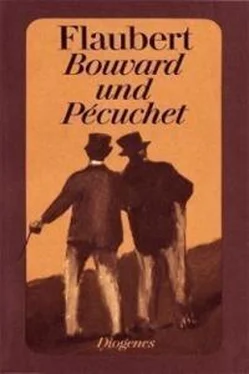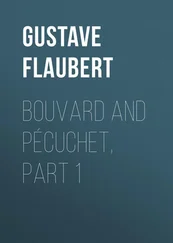"What right have we to go there? That would be to let loose Europe against us. No imprudence!"
And everybody approving of this, the two Poles held their tongues.
On another occasion, Vaucorbeil spoke in favour of Ledru–Rollin's circulars.
Foureau retorted with a reference to the forty–five centimes.
"But the government," said Pécuchet, "has suppressed slavery."
"What does slavery matter to me?"
"Well, what about the abolition of the death–penalty in political cases?"
"Faith," replied Foureau, "they would like to abolish everything. However, who knows? the tenants are already showing themselves very exacting."
"So much the better! The proprietors," according to Pécuchet, "had been too much favoured. He that owns an estate―"
Foureau and Marescot interrupted him, exclaiming that he was a communist.
"I—a communist!"
And all kept talking at the same time. When Pécuchet proposed to establish a club, Foureau had the hardihood to reply that they would never see such a thing at Chavignolles.
After this, Gorju demanded guns for the National Guard, the general opinion having fixed on him as instructor. The only guns in the place were those of the firemen. Girbal had possession of them. Foureau did not care to deliver them up.
Gorju looked at him.
"You will find, however, that I know how to use them."
For he added to his other occupations that of poaching, and the innkeeper often bought from him a hare or a rabbit.
"Faith! take them!" said Foureau.
The same evening they began drilling. It was under the lawn, in front of the church. Gorju, in a blue smock–frock, with a neckcloth around his loins, went through the movements in an automatic fashion. When he gave the orders, his voice was gruff.
"Draw in your bellies!"
And immediately, Bouvard, keeping back his breath, drew in his stomach, and stretched out his buttocks.
"Good God! you're not told to make an arch."
Pécuchet confused the ranks and the files, half–turns to the right and half–turns to the left; but the most pitiable sight was the schoolmaster: weak and of a slim figure, with a ring of fair beard around his neck, he staggered under the weight of his gun, the bayonet of which incommoded his neighbours.
They wore trousers of every colour, dirty shoulder–belts, old regimentals that were too short, leaving their shirts visible over their flanks; and each of them pretended that he had not the means of doing otherwise. A subscription was started to clothe the poorest of them. Foureau was niggardly, while women made themselves conspicuous. Madame Bordin gave five francs, in spite of her hatred of the Republic. M. de Faverges equipped a dozen men, and was not missing at the drill. Then he took up his quarters at the grocer's, and gave those who came in first a drink.
The powerful then began fawning on the lower class. Everyone went after the working–men. People intrigued for the favour of being associated with them. They became nobles.
Those of the canton were, for the most part, weavers; others worked in the cotton mills or at a paper factory lately established.
Gorju fascinated them by his bluster, taught them the shoe trick, [16] La savate —a military practice of beating with an old shoe soldiers unskilful at drill.—TRANSLATOR.
and brought those whom he treated as chums to Madame Castillon's house for a drink.
But the peasants were more numerous, and on market days M. de Faverges would walk about the green, make inquiries as to their wants, and try to convert them to his own ideas. They listened without answering, like Père Gouy, ready to accept any government so long as it reduced the taxes.
By dint of babbling, Gorju was making a name for himself. Perhaps they might send him into the Assembly!
M. de Faverges also was thinking of it, while seeking not to compromise himself.
The Conservatives oscillated between Foureau and Marescot, but, as the notary stuck to his office, Foureau was chosen—a boor, an idiot. The doctor waxed indignant. Rejected in the competition, he regretted Paris, and the consciousness of his wasted life gave him a morose air. A more distinguished career was about to open for him—what a revenge! He drew up a profession of faith, and went to read it to MM. Bouvard and Pécuchet.
They congratulated him upon it. Their opinions were identical with his. However, they wrote better, had a knowledge of history, and could cut as good a figure as he in the Chamber. Why not? But which of them ought to offer himself? And they entered upon a contest of delicacy.
Pécuchet preferred that it should be his friend rather than himself.
"No, it suits you better! you have a better deportment!"
"Perhaps so," returned Bouvard, "but you have a better tuft of hair!" And, without solving the difficulty, they arranged their plans of conduct.
This vertigo of deputyship had seized on others. The captain dreamed of it under his foraging–cap while puffing at his pipe, and the schoolmaster too in his school, and the curé also between two prayers, so that he sometimes surprised himself with his eyes towards heaven, in the act of saying, "Grant, O my God, that I may be a deputy!"
The doctor having received some encouragement, repaired to the house of Heurtaux, and explained to him what his chances were. The captain did not stand on ceremony about it. Vaucorbeil was known, undoubtedly, but little liked by his professional brethren, especially in the case of chemists. Everyone would bark at him; the people did not want a gentleman; his best patients would leave him. And, when he weighed these arguments, the physician regretted his weakness.
As soon as he had gone, Heurtaux went to see Placquevent. Between old soldiers there should be mutual courtesy, but the rural guard, devoted though he was to Foureau, flatly refused to help him.
The curé demonstrated to M. de Faverges that the hour had not come. It was necessary to give the Republic time to get used up.
Bouvard and Pécuchet represented to Gorju that he would never be strong enough to overcome the coalition of the peasants and the village shop–keepers, filled him with uncertainty, and deprived him of all confidence.
Petit, through pride, had allowed his ambition to be seen. Beljambe warned him that, if he failed, his dismissal was certain.
Finally, the curé got orders from the bishop to keep quiet.
Then, only Foureau remained.
Bouvard and Pécuchet opposed him, bringing up against him his unfriendly attitude about the guns, his opposition to the club, his reactionary views, his avarice; and even persuaded Gouy that he wished to bring back the old régime . Vague as was the meaning of this word to the peasant's mind, he execrated it with a hatred that had accumulated in the souls of his forefathers throughout ten centuries; and he turned all his relatives, and those of his wife, brothers–in–law, cousins, grand–nephews (a horde of them), against Foureau.
Gorju, Vaucorbeil, and Petit kept working for the overthrow of the mayor; and, the ground being thus cleared, Bouvard and Pécuchet, without any doubt, were likely to succeed.
They drew lots to know which would present himself. The drawing decided nothing, and they went to consult the doctor on the subject.
He had news for them: Flacardoux, editor of Le Calvados , had announced his candidature. The two friends had a keen sense of having been deceived. Each felt the other's disappointment more than his own. But politics had an exciting influence on them. When the election–day arrived they went to inspect the urns. Flacardoux had carried it!
M. de Faverges had fallen back on the National Guard, without obtaining the epaulet of commander. The people of Chavignolles contrived to get Beljambe nominated.
Читать дальше








![Гюстав Флобер - Закат Карфагена [Сборник]](/books/414440/gyustav-flober-zakat-karfagena-sbornik-thumb.webp)


